Alaska Facts | Facts about Alaska | Kids World Travel Guide | USA
Mục Lục
alaska Facts
Our Alaska Facts for Kids provide interesting and fun facts about the biggest state of the United States of America, the country and people, attractions and geographical superlatives and all important facts about Alaska you really should know.
Alaska Facts for Kids
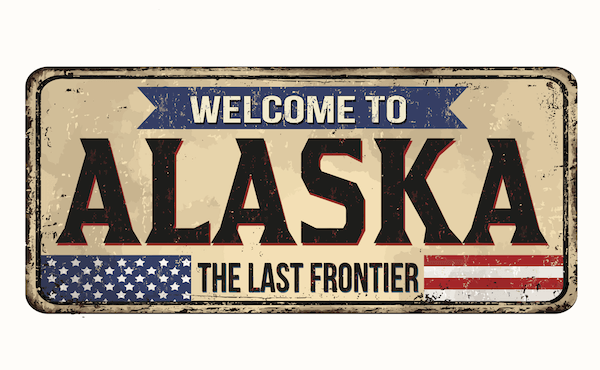
Top 30 Alaska Facts | USA
1. Alaska is the largest state of the United States of America and is about twice as big as Texas or four times as big as California. Alaska is roughly the size of the five European countries of Germany, Austria, Switzerland, Italy and France combined!
2. Alaska’s capital is called Juneau. The state capital can only be reached by water or by air. Although Juneau is located on the Alaskan mainland, the terrain is rough and there are no roads linking the capital to any other city.
3. Juneau is the only US capital situated at an international border and borders Canada in the east of the city’s borders.
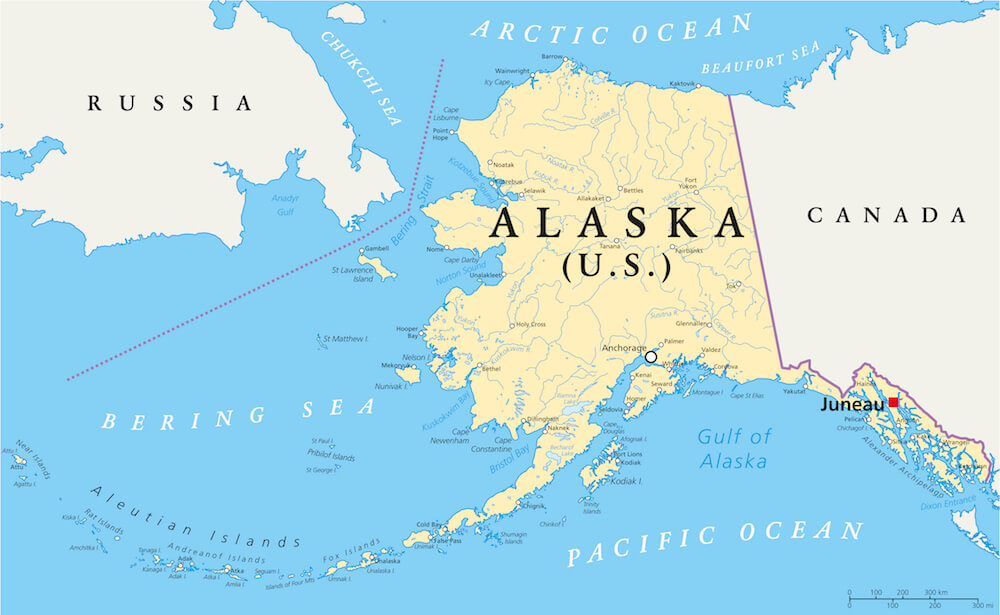
Map of Alaska
4. Alaska borders the Pacific Ocean and the Arctic Ocean. In fact, Alaska has the longest coastline of any US state with 55,000 km/ 34,000 miles.
5. The Alaska-Canada border is 2,475 km/ 1,538 miles long and is the longest land border of any US state with Canada.
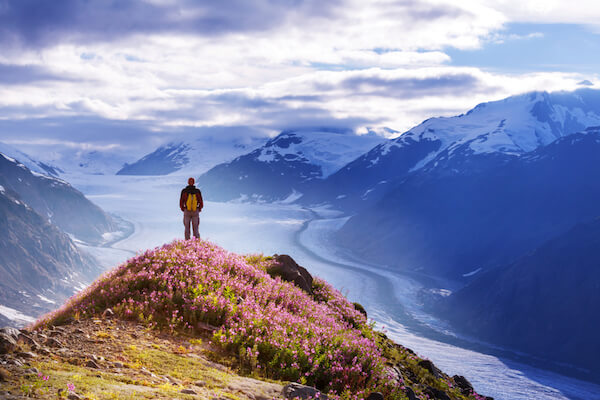
Summer hike in Alaska
6. Alaska has a population of about 700,000 people. The majority of the people in Alaska live in southern central parts of the state.
7. Anchorage is Alaska’s most populous city with about 250,000 inhabitants.
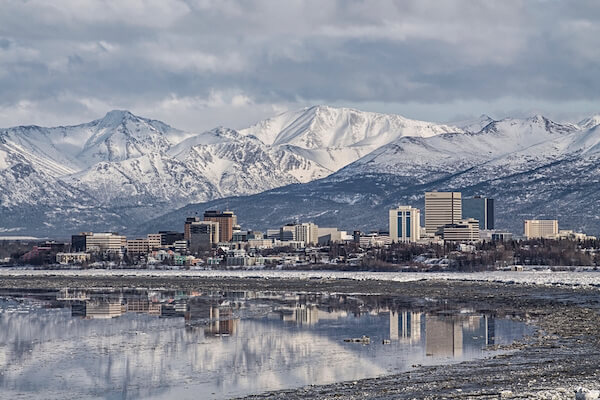
Anchorage in Alaska
8. Alaska houses the two largest US cities by land area: Juneau is the second largest city of the USA by land area – after Sitka, which is also located in Alaska. Sitka has only about 9,000 inhabitants!
Alaska Facts | Geography
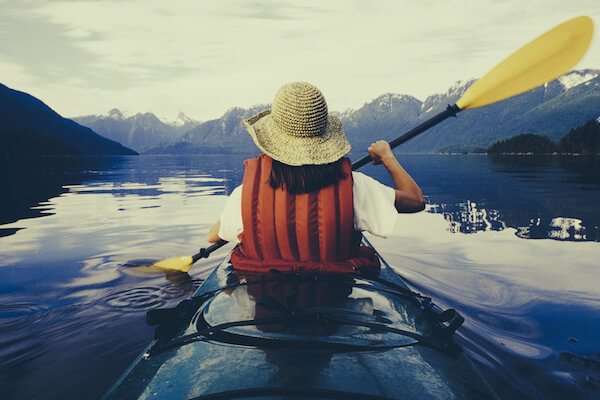
Kayaking in Glacier Bay
9. About five percent of Alaska’s land area is covered by glaciers. There are more ice fields and glaciers in Alaska than anywhere in the world.
10. Alaska is located along the Pacific Ring of Fire which means earthquakes happen regularly in this state. Three of the ten strongest earthquakes ever recorded happened in Alaska. About 10% of the world’s volcanos are located in Alaska.
Alaska Facts | Geography Superlatives
11. The Bering Glacier complex is North America’s largest and longest glacier.
12. The tallest mountain in Alaska is called Denali, the ‘Great One’. Mount Denali, formerly called Mount McKinley, is 6,190 m/ 20,310 ft high. Denali is the tallest mountain in the USA. Did you know that Alaska is the state housing 17 of 20 tallest mountains of the USA?
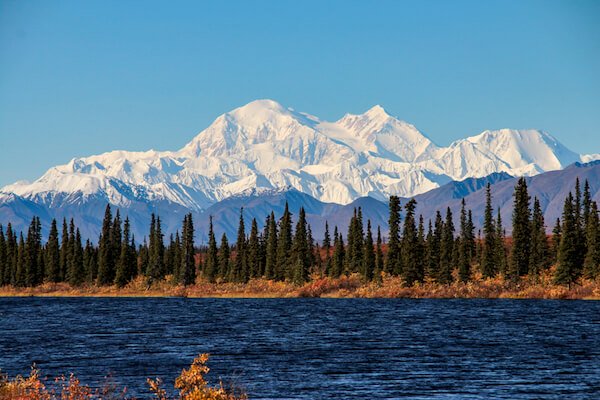
Mount Denali, formerly called Mount McKinley
13. The longest river in Alaska is the Yukon river, which is the third longest river in North America. There are more than 3,000 rivers in Alaska. The Yukon runs through Alaska over 3,017 km/ 1,875 miles. In total, the Yukon river is 3,698km/ 2,298 miles long.
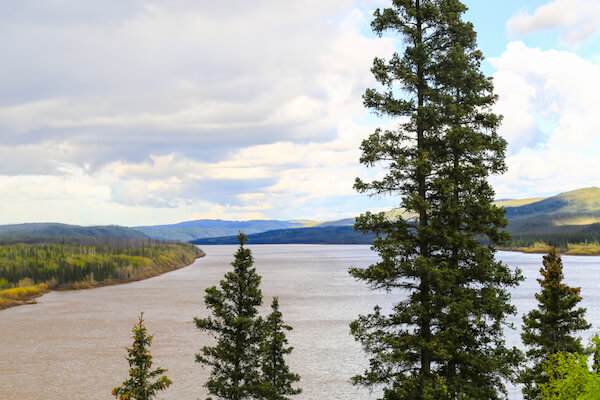
Yukon River
14. The largest lake in Alaska is Lake Iliamna. This is also the third largest lake that is entirely located in the USA. There are more than 3 million lakes in Alaska.
15. The largest piedmont glacier in the world is called Malaspina, it is located in Alaska. This glacier is as big in size as the land area of the state as Rhode Island. The ice spills out of the mountains into a huge lobe form glacier. Malaspina is located in south eastern Alaska. The ice of this glacier is up to 600 m/ 2,000 ft thick!
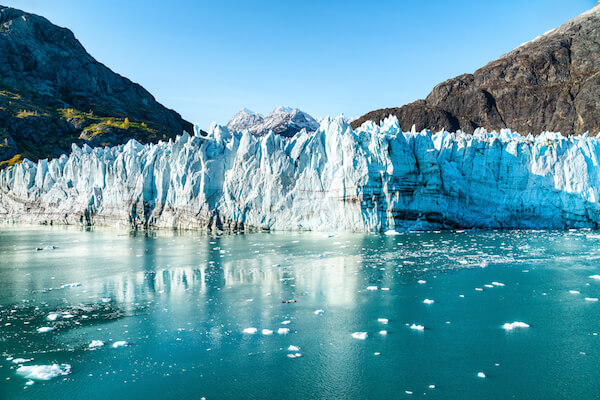
Glacier in Alaska
Alaska Facts | Name and State Symbols
16. The name Alaska is derived from the Aleut word Aleyska, which means “great land” or “mainland”.
17. The state has the nickname: “The Last Frontier”. The motto of the state is: “North to the Future” refers to Alaska as the ‘land of promise’.
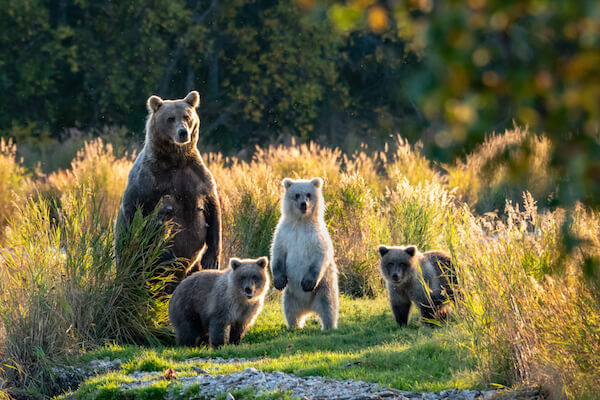
Alaskan brown bear with cubs
18. A little history on Alaska: The United States purchased Alaska from Russia in 1867. ‘Alaska Day’ is celebrated as a public holiday on 18 October. Alaska day remembers transfer of the territory from Russia to the USA in 1867.
19. Alaska is the 49th state of the USA and gained statehood in 1959 under President Dwight Eisenhower
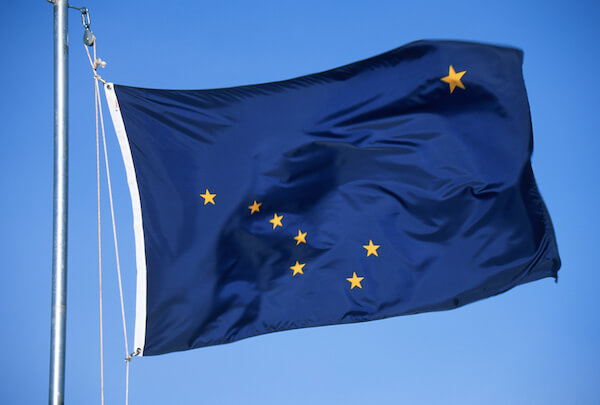
Flag of Alaska
20. The Alaska flag is deep blue with eight golden stars. The stars form the Big Dipper, which is a constellation of the Ursa Major (or Great Bear) and the Polaris (or North Star). The flag design was originally created in 1926 by a 13-year-old student. The boy called Benny Benson won the flag design contest.
21. The official state animal of Alaska is the moose and the blue coloured Alpine Forget-me-not is the official state flower.
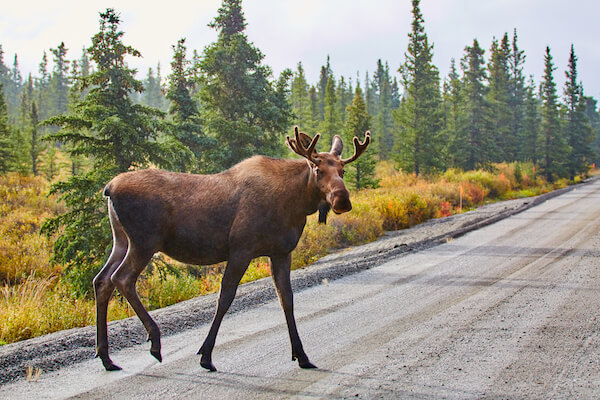
Moose in Denali National Park
Alaska Facts | Alaska People
22. Natives have lived and moved through Alaska for at least 10,000 years. Today only about 15% of the people are Alaska Natives. Danish explorer Bering was the first European who discovered the Alaskan mainland in 1741.
23. The first non-native settlers, however, were trappers and fur traders from Russia who built the first settlement in Three Saints Bay in 1784.
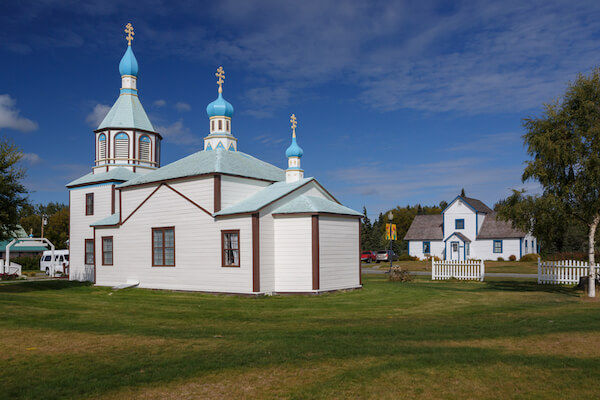
Russian church in Kenai/Alaska
24. Gold was discovered in Alaska in 1896. The gold rush brought many more new settlers to the region during the 1890s.
25. Alaska is home to people of all different ethnic groups, different religions. 62% of the Alaskans say they are Christians.
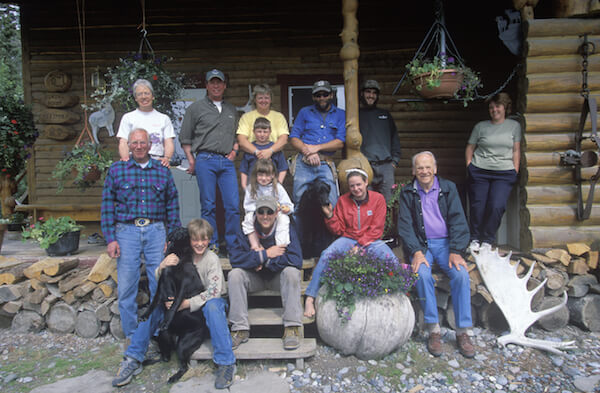
Three generations of Alaskan family – image by Joseph Sohm
26. English and 20 Alaska Native languages are recognised as official state languages. Over 16% of the Alaskans speak a language other than English. Central Yup’ik, Inupiaq (Inuit) and Tlingit are the most spoken native languages.
Facts about Alaska | Economy
27. The most important industry sector of Alaska is the oil and gas sector. Almost 90% of the state’s revenue comes form the oil and gas industry.
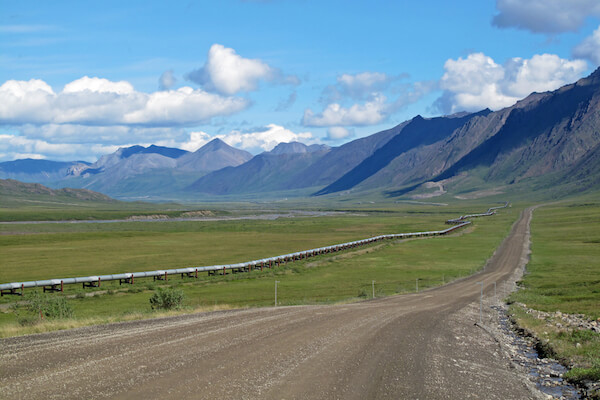
Oil pipeline running through the Alaskan countryside
28. Prudhoe Bay Oil field in northern Alaska is one of the largest oil fields of North America, however, the oil reserves are almost depleted.
More Facts about Alaska
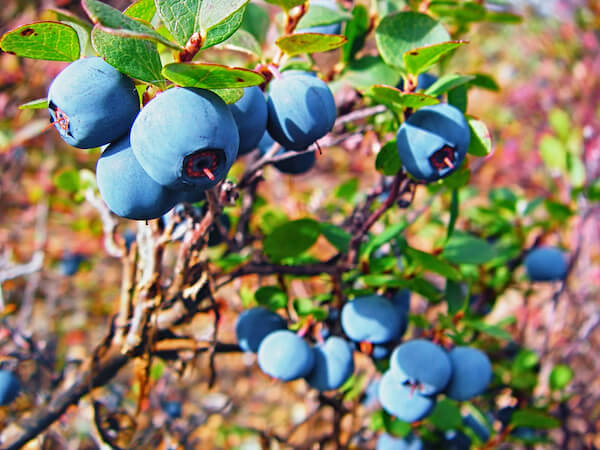
Blueberries can be found all over Alaska in late summer
29. Alaska Facts | Time Zones: Almost all regions of the vast state apply one time zone. The Alaska Time Zone (UTC-9:00) is one hour behind the Pacific Time Zone. Alaska also adheres to daylight saving time during the warmer summer months from second Sunday in March to first Sunday in November.
30. Alaska Facts | Famous Landmarks: Among the most visited tourist sites and landmarks in Alaska are:
- Denali National Park – highest mountain of the USA
- Prince William Sound – glacier viewing
- Kodiak Island – brown bear sightings
- Sitka National Historic Park – large collection of totems
- Valdez Trail of the Whispering Giants – totems
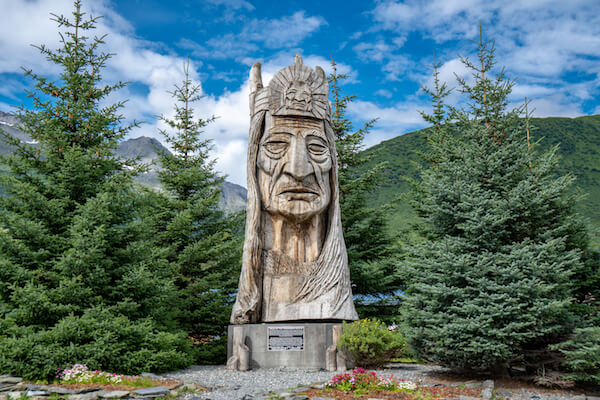
Alaska Trail of the Whispering Giants
Popular Pages
Useful Resources for Alaska Facts:
This page was last updated on 27 July 2021.
- City of Ketchikan Alaska. “Arts and Culture” VisitKetchikan. Last accessed 27 July 2021
- Smithsonian Magazine. “Alaska – Landmarks and Points of Interest.” Smithsonian. 6 November 2007. Last accessed 27 July 2021
- LitesiteAlaska.org. “Know Alaska.” AlaskaKids. Last accessed 27 July 2021
- State of Alaska Official Site. “State of Alaska – Kids Corner.” Alaska.gov. Last accessed 27 July 2021
- Alaska Native Language Centre. “Languages – Dena’Ina.” University of Alaska. Last accessed 27 July 2021
Image Credits on Alaska Facts page: Shutterstock.com and wikipedia commons
Return from Alaska Facts to Kids-World-Travel-Guide Homepage






